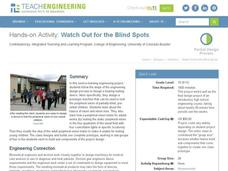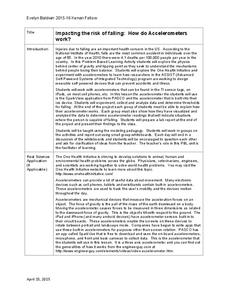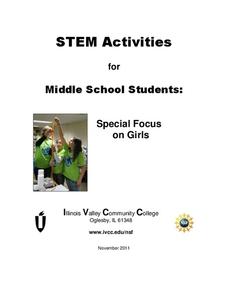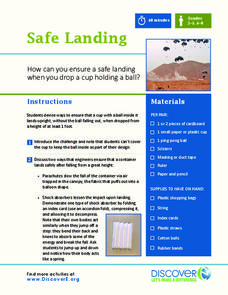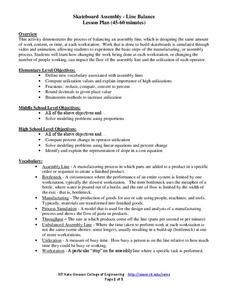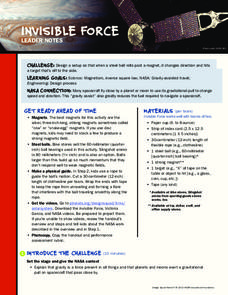Teach Engineering
Nanotechnology as a Whole
It's a small (nanotechnology) world after all! The first segment of a six-part series gives an overview of nanotechnology, its principles and applications, and shares some of the engineering applications of nanotechnology. A presentation...
Teach Engineering
Watch Out for the Blind Spots
Applying engineering concepts to the field of medicine, pupils design a device to help test peripheral sight. The class learns and follows a specific design process for engineers before separating into groups; each group builds a...
DiscoverE
A Leg to Stand On
Give your learners a leg up in their study of engineering. Groups design and create a prothestic for a leg. They test out their designs for strength, stability, durability, and comfort.
Teach Engineering
Will It Fly?
Go fly a kite, then fly a plane! The 19th part of a 22-part unit on aviation looks at the way kites and gliders help aid in the understanding of flight. Pupils discuss how engineers used kites to influence airplane designs.
Institute of Electrical and Electronics Engineers
Water Rocket Launch
How do rockets fly? Teams design, build, and launch a rocket made from a two-liter bottle to explore forces on a rocket such as Newton's Laws of Motion. During the design phase, young engineers draw a diagram of their rocket and include...
Teach Engineering
Imagining DNA Structure
Let's get a closer look at DNA and other molecular structures. The first instructional activity in the series of four introduces a variety of imagining techniques that engineers and scientists use to visualize molecular structures. The...
Discovery Education
Jets in Flight
This Discovery Education activity provides the information needed to understand the basics of flight. Before taking off, young pilots learn the eight stages of the engineering design process. Small groups then design and build an...
Kenan Fellows
Impacting the Risk of Falling: How Do Accelerometers Work?
Young engineers consider how to apply accelerometers and sensors to help prevent falls in elderly people. They consider forces of motion and gravity as part of the engineering design process.
Kenan Fellows
The Newton Challenge
Make Newton proud. Scholars apply their understanding of forces and energy to an engineering design challenge. They learn about simple machines, create a presentation on Newton's laws, and develop a balloon-powered car.
TryEngineering
Nano Waterproofing
Does your shirt hate water? In the activity, future engineers observe the hydrophobic effect in fabrics. They brainstorm and test some ideas for waterproofing fabrics.
Tech Museum of Innovation
Seed Dispersal
Engineering challenges are not just man-made ... nature has its own set of them. A hands-on STEM activity has groups designing a seed dispersal system. Each group can only use one sheet of paper — a tough task!
Purdue University
Design of an Earthen Dam for a Lafayette Neighborhood
How do dams support bodies of water? Scholars engage in a hands-on STEM activity where they design, build, and test dams to learn about bodies of water and how humans use natural resources. They learn how criteria and constraints affect...
IOP Institute of Physics
Physics in Concert
What do physicists and musicians have in common? A lot more than you might think. After first viewing a slide show presentation and completing a series of skills practice worksheets on the physics of light, sound, and electricity, young...
Teach Engineering
Storing Android Accelerometer Data: App Design
There's an app for that! Pupils learn to build an app that will store data on an Android. The instructional activity introduces class members to the tiny database, TinyDB, for Android devices. A video tutorial provides an example that...
Illinois Valley Community College
STEM Activities for Middle School Students
Use STEM activities within the class to provide connections to concepts. The resource includes activities that range from working with buoyancy to building rockets and launching them. Other activities involve the engineering design...
DiscoverE
Safe Landing
Watch out below! Future engineers come up with methods to ensure that a ball in a cup stays in the cup even after dropped from a given height. It might be prudent to include some kind of shock absorber in the cup. Parachutes are a good...
DiscoverE
Build a Big Wheel
Pasta is great for cooking—and for making Ferris wheels. Aspiring engineers use an assortment of pasta types to create a functioning Ferris wheel. They keep track of the design process to refine their designs, if necessary. Let's hope no...
Mascil Project
Packaging
Wrap up an engineering lesson with a worthwhile project. An engineering design task challenges groups to develop a package for a pharmaceutical company given constraints on the volume. Learners then create a presentation to highlight...
Mascil Project
The Pipe Clamp
Clamp onto the resource and don't let go. Future mechanical engineers produce a pipe clamp from a sheet of metal. This idea is to use the pipe clamp to affix a pull-up bar in a doorway.
Rochester Institute of Technology
Skateboard Assembly - Line Balance
Utilize the instructional activity on utilization. The second installment of a nine-part technology/engineering series teaches scholars about the flow of a balanced assembly line and the definition of utilization. Videos, activities, and...
Rochester Institute of Technology
Hazmat Disposal
What a waste! The last installment of a nine-part technology/engineering series teaches learners about medical waste disposal systems. Conducting a simulation allows individuals to understand how monetary considerations constrain waste...
Curated OER
Concrete for Kids
Although preparation-intensive, this would be an unforgettable experience in materials engineering. Stimulate learners' curiosity with a slide show and then introduce them to the components of concrete. Small groups mix and pour concrete...
PBS
Invisible Force
Investigate invisible forces. Young engineers design a setup that changes the direction of a steel ball using a magnetic force. The purpose of the setup is to model the gravitational pull of spacecraft by planetary bodies.
PBS
Robo Arm
Future engineers create robotic arms like those on rovers built by NASA in the second lesson of the series. They test their devices by attempting to pick up and move cups to a specified location.



